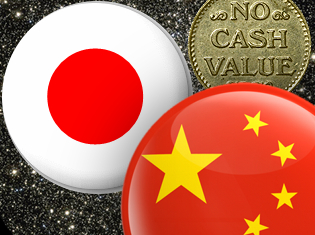 Casino operators looking to set up shop in Japan will likely face a maximum 20% tax on gross revenue, according to Union Gaming Research. Half of that slice will go to the national government, while local governments in whose jurisdictions the casinos are built will take the same or less. With some discretion as to the local rate, hopeful prefectures within cities like Tokyo and Osaka could engage in a bidding war to lure operators. Union Gaming analysts believe such competition between prefectures could reduce the total tax in some regions to not much over 10%, a significant savings over Macau’s effective 39% rate.
Casino operators looking to set up shop in Japan will likely face a maximum 20% tax on gross revenue, according to Union Gaming Research. Half of that slice will go to the national government, while local governments in whose jurisdictions the casinos are built will take the same or less. With some discretion as to the local rate, hopeful prefectures within cities like Tokyo and Osaka could engage in a bidding war to lure operators. Union Gaming analysts believe such competition between prefectures could reduce the total tax in some regions to not much over 10%, a significant savings over Macau’s effective 39% rate.
This weekend’s decision to award the 2020 Olympic Games to Tokyo has significantly boosted talk of Japanese casinos, but a possibly far more significant event appears to be happening (again) on the Chinese island of Hainan, where ‘cashless’ casinos are making a comeback. These casinos – in which gamblers’ winnings are paid in points that can only be redeemed for goods and services at the casino’s hotel – appeared suddenly in February only to close just as abruptly after the authorities determined the casino owners had “gone beyond the scope of the regulations.”
Jesters, the Mangrove Tree Resort facility whose Reuters’ profile sparked the media focus on the cashless casino phenomenon, quietly reopened just four months after it was shuttered. A second “special entertainment facility” is prepping to open at Hainan’s Ocean Sonic Resort and a third facility is expected to open at another resort within a few months. A source told Macau Business Daily that the Ocean Sonic Resort casino would feature 40 gaming tables, 50 electronic gaming machines (EGM) and would work “a little bit like a pachinko parlor in Japan.”
According to the anonymous analyst, the casino sells ‘entry vouchers’ in multiples of RMB 500 (US $82) on which the local government imposes a 5% tax. The purchased points are loaded onto a reward card, with which players wager and to which any winnings are added. Those Hainan resorts lucky enough to be issued with the special licenses are all developing “large entertainment, retail and convention areas” at which points can be redeemed, but as with Japan’s pachinko parlors, someone “independent of the venue management” is willing to convert winnings back into cash.
A separate source claimed that the Ocean Sonic Resort’s “special entertainment license” came straight from Beijing and that a number of other licenses may have already been issued to some of the island’s 380 registered hotels. As early as March, sources told the Macau Daily Times that Beijing had been preparing to issue 10 such licenses before the media storm broke and iGamiX managing partner Ben Lee suggested that process would resume once the media got distracted by something shiny.
The suspicion is that these ersatz casinos will eventually be given the nod to go the full cash route, as Beijing appears to want to develop a mass market gaming alternative to Macau in which non-gaming sources account for the bulk of revenue. That phenomenon is already occurring in Las Vegas and US casino companies like Caesars Entertainment and MGM Resorts have established non-gaming properties on Hainan, but Lee believed Beijing intended to reserve the licenses for domestic companies. Then again, perhaps there’s a guy who hangs out behind the National People’s Congress in Beijing with whom one can talk about converting some ‘points’ into a gaming license…?






